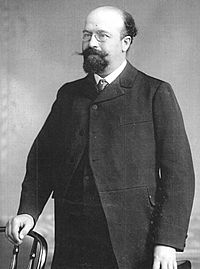Bernard Lazare facts for kids
Bernard Lazare (born June 14, 1865, in Nîmes, France – died September 1, 1903, in Paris) was a French writer and journalist. He was known for his strong opinions and his fight for justice. He became famous for being the first person to openly support Captain Alfred Dreyfus during the famous Dreyfus affair.
Contents
Lazare's Early Life and Ideas
Bernard Lazare was born Lazare Marcus Manassé Bernard in Nîmes on June 15, 1865. He later changed his name to Bernard Lazare. His family was Jewish, but they were not very religious. They belonged to the middle class.
As a young man, Lazare became interested in a literary movement called Symbolism. This led him to learn about anarchism, which is a political idea about societies without strong government control. He began his career writing about books and literature. In 1894, he even defended some anarchists in court.
Fighting Against Antisemitism
In 1894, Lazare published an important book called Anti-Semitism, its History and Causes. This book looked deeply into where antisemitism (hatred or unfair treatment of Jewish people) came from.
Just a few months after his book came out, Captain Alfred Dreyfus was arrested. Dreyfus was a Jewish army officer accused of treason. Bernard Lazare was known for being brave and fighting for what he believed in. Because of this, Dreyfus's brother, Mathieu Dreyfus, asked Lazare for help to prove Alfred's innocence.
The Dreyfus Affair and Lazare's Role
Lazare dedicated all his time to the Dreyfus case. At first, he wrote a paper that said Dreyfus's trial was not just a mistake. He believed it was part of a plan by people who hated Jewish people. This first version was not published. The Dreyfus family wanted to focus on proving Alfred's innocence, not on antisemitism.
However, the unfair conviction of Dreyfus changed Lazare's views. He started writing more strongly in Parisian newspapers to defend Jewish people. He even had a duel with a writer named Édouard Drumont, who was known for his antisemitic views. Luckily, no one was hurt.
In November 1896, Lazare's paper was finally published in Belgium. It was called "A Judicial Error: The Truth about the Dreyfus Affair." He published it in Belgium because he worried the French police would stop it in France. In this paper, Lazare showed point by point why the accusation against Dreyfus was wrong. He demanded that Dreyfus's sentence be overturned.
This paper was a big deal. Many friends and colleagues turned away from Lazare. French newspapers widely criticized him. Public opinion at the time was mostly against Dreyfus. Newspapers were angry that Lazare was bringing up antisemitism. They often mentioned that Lazare himself was Jewish. Lazare later wrote that he felt like an outcast.
Lazare then published a much longer version of his paper. It was nearly 300 pages long. This time, he felt free to speak his mind about antisemitism. He wrote, "It is because he was Jewish that he was arrested, it is because he was Jewish that he was judged, it is because he was Jewish that he was condemned."
Later Life and Activism
Because of his experiences during the Dreyfus Affair, Lazare became very involved in helping Jewish people gain equal rights. He was warmly welcomed at the First Zionist Congress. This was a meeting for people who supported the idea of Jewish self-determination.
Lazare traveled with Zionist leader Theodor Herzl. They respected each other greatly. However, Lazare later disagreed with Herzl's plans for the Zionist movement. Lazare believed in Jewish freedom and community. He did not necessarily want a separate Jewish state. He saw Zionism as a way for Jewish working-class people to organize and be free.
In 1900 and 1902, he visited Romania. After his trips, he wrote about the terrible conditions for Romanian Jews in a newspaper called L'Aurore. He also visited Russia to report on dangers facing Jews there. Sadly, he became ill and could not publish his findings. He also went to Turkey to defend Armenians who were being persecuted.
After the Dreyfus trial in Rennes, some of his supporters stopped him from writing for l'Aurore. But Lazare still covered the trial. He sent his strong reports to two American magazines. Towards the end of his life, he became friends with Charles Péguy. He wrote for Péguy's publication, Cahiers de la quinzaine.
Bernard Lazare's Works
Non-fiction
- L'Antisémitisme, son histoire et ses causes (translated as Anti-Semitism, its History and Causes) (1894)
- Une erreur judiciaire: La vérité sur l’affaire Dreyfus ("A Judicial Error: The Truth about the Dreyfus Affair") (pamphlet, November 1896)
Fiction
- Le Miroir des Légendes (The Mirror of Legends) (1892)
- Les Porteurs des Torches (1897)
- Les Portes d'ivoire (1898)
See also
 In Spanish: Bernard Lazare para niños
In Spanish: Bernard Lazare para niños
- Anarchism in France
- Dreyfus affair
 | Selma Burke |
 | Pauline Powell Burns |
 | Frederick J. Brown |
 | Robert Blackburn |


